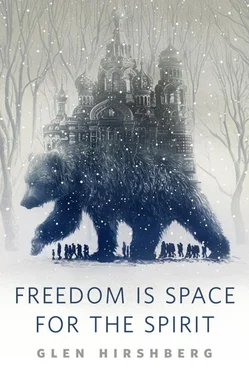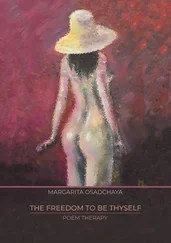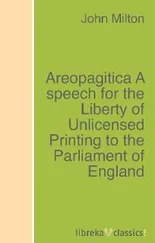Glen Hirshberg - Freedom is Space for the Spirit
Здесь есть возможность читать онлайн «Glen Hirshberg - Freedom is Space for the Spirit» весь текст электронной книги совершенно бесплатно (целиком полную версию без сокращений). В некоторых случаях можно слушать аудио, скачать через торрент в формате fb2 и присутствует краткое содержание. Город: New York, Год выпуска: 2016, ISBN: 2016, Издательство: Tom Doherty Associates, Жанр: Фэнтези, story, на английском языке. Описание произведения, (предисловие) а так же отзывы посетителей доступны на портале библиотеки ЛибКат.
- Название:Freedom is Space for the Spirit
- Автор:
- Издательство:Tom Doherty Associates
- Жанр:
- Год:2016
- Город:New York
- ISBN:978-0-765-38938-1
- Рейтинг книги:3 / 5. Голосов: 1
-
Избранное:Добавить в избранное
- Отзывы:
-
Ваша оценка:
- 60
- 1
- 2
- 3
- 4
- 5
Freedom is Space for the Spirit: краткое содержание, описание и аннотация
Предлагаем к чтению аннотацию, описание, краткое содержание или предисловие (зависит от того, что написал сам автор книги «Freedom is Space for the Spirit»). Если вы не нашли необходимую информацию о книге — напишите в комментариях, мы постараемся отыскать её.
Freedom is Space for the Spirit — читать онлайн бесплатно полную книгу (весь текст) целиком
Ниже представлен текст книги, разбитый по страницам. Система сохранения места последней прочитанной страницы, позволяет с удобством читать онлайн бесплатно книгу «Freedom is Space for the Spirit», без необходимости каждый раз заново искать на чём Вы остановились. Поставьте закладку, и сможете в любой момент перейти на страницу, на которой закончили чтение.
Интервал:
Закладка:
Glen Hirshberg
FREEDOM IS SPACE FOR THE SPIRIT

Vasily’s message arrived by telegram, and Thomas couldn’t bring himself to open it right away. His assumption was that another of the old gang had died. He settled on the red leather couch by the fire in his Charlottenburg apartment and held the envelope, wet from the snow outside, in his hands. Eventually, Jutta stuck her head out of her sculpture studio. She wiped the back of her palm across her dusty, still-sharp cheekbones.
“Good God,” Jutta said, “is that really a telegram?”
“From Vasily.”
“Obviously. He lost his cell phone somewhere?”
“Last I heard—and it was a long time ago—he still uses burners. He doesn’t trust cell phones.”
“Internet cafés all closed?”
“I don’t even think he has e-mail. He doesn’t trust that, either.”
“But he trusts his local telegraph operator? Assuming there are such people still in St. Petersburg? Or here? Or anywhere?”
Grinning, she moved toward the couch, and Thomas had to fight back a momentary and selfish flicker of annoyance. Whatever was in the telegram, he didn’t want to share it, at least not right away. Feeling childish, he watched Jutta lumber closer, her hand on her swelling belly. She smiled at him, and the orange from the fire in the grate caught in her eyes.
“What does it say?”
In the old days, at the end of Soviet times or during the wild Yeltsin years—back when they’d really been doing something, when the art had been the moment itself and not the preserving or capturing or remembering of it—Thomas would have torn open the envelope, tossed it aside. But for this one—the first in years—he fished out his pocketknife, slit the fold, withdrew the folded yellow paper, and laid the envelope carefully atop the Gerhard Richter Baader-Meinhof monograph on the end-table. Then he opened Vasily’s message, and though Jutta could see the words—English words—as well as he could, he read them aloud:
“Happening now. STOP. Invitation letter at Consulate. STOP. Hurry. STOP. FISTS.”
“You know,” said Jutta, “I’m pretty sure they don’t need to say STOP anymore.”
Thomas nodded. “Vasily probably just liked using STOP.”
“And telegrams.”
“Everything about this.” To his astonishment, Thomas felt tears in his eyes.
Jutta was standing right next to him, now, staring down at the note. “They still make us get invitation letters?”
“It’s still Russia,” Thomas murmured.
“I guess,” said Jutta, and for a single moment, in her voice, he heard a hint, a suggestion of exactly the feelings he was having. And of course, that was only fair. She had been there, too. Eventually. He looked away, but Jutta’s dusty, strong-fingered hand slid over his. “Thomas,” she said. “Go.”
“I can’t. The baby.”
“Is due in three months.”
“Term. Classes—”
“Start in two weeks.”
“This is Vasily. Whatever he’s up to could last longer than that.”
“Get a cold. Get pneumonia. Your students will live.”
“I’m not…” he said. Then, “I don’t…”
“Call the consulate,” said Jutta. “Get Vasily’s invitation letter and your visa. Go.” Turning away, she threw a tiny sliver of soapstone into the fire; She has missed all this, too , he realized. If not for the baby they’d both assumed they were too old to expect, she’d have dropped everything and gone with him.
In truth, for that matter, she’d have gone without him.
On impulse, and to save money, he took the train. And because he’d somehow transformed, right as he entered his forties, into a tenure-tracked Juniorprofessor der situationistichen Kunst who could almost afford it, he took the fast train. He even treated himself to the last second-class bunk in the last available cabin; he was very nearly a father, after all, and long out of practice. He would be of more use to Vasily rested.
The first hours passed in a blissful, bleary-eyed blur. In the observation car, he shared zákusky and vodka with a wealthy American couple, both in their sixties, headed to Poland for some sort of pensioners’ opera-singer training camp. Thomas’s spoken English was rusty and his alcohol tolerance significantly diminished, so he wasn’t entirely sure he’d understood his companions correctly. But they laughed easily and offered him saltine crackers from their travel bags once they’d polished off the zákusky . Better still, they went silent when the train, slowed by snow, crept into the Lower Oder Valley, and the full moon shot up over the marshlands like a comet streaking over the earth, shedding snow flurries that glittered in the air and on the trees, and silvered the surface of the river.
Later, retreating to his bunk, he met his cabinmates, a blond father and his two white-blond, teenaged sons, all smoking and arguing loudly in Finnish. But they quieted without his asking. The whole time Thomas sorted through his hastily packed duffel bag, scrubbed his face with a wet wipe, changed his shirt, and tried to settle on top of the blankets, the Finns stayed silent. When he laid back, one of the sons wordlessly flicked off the light. And so, for a few minutes, wedged into a rut in the hard mattress as if anchored to a cliff face, Thomas imagined he might sleep. Then the party broke out in the corridor.
Poles, mostly, he thought, listening to their laughter streaming under the bottom of the cabin door along with their cigarette smoke. Some Czechs or Slovaks, too. Kids, mostly. When Thomas sat up, he was surprised to see his cabinmates in their bunks, all of them sleeping or at least motionless.
How can they sleep? he wondered. And then, How can they want to?
Suddenly, he was out of his berth and back in his sneakers. As quietly as he could—silly, really, given the racket from outside—he edged open the door and stepped into the hall.
Almost immediately, the gaggle of students edged away down the corridor, taking up spots at the next windows down, throwing those open to the cold, the whipping wind. They laughed as clouds of snow whirled into the train, exploding against the walls like birds smacking into glass. Smoking and shouting and drinking and laughing, the students ignored Thomas completely.
It was absurd, of course, to expect any different, except that Thomas did . After all, he’d seen so much that they hadn’t, done so much that they hadn’t: won a yearlong study fellowship to St. Petersburg State, then, with Vasily’s help, almost immediately slipped his minders (mostly, admittedly, because why would they have bothered minding him much?) and joined Vasily’s crew of expats and expelled students and poseurs and rabble. For nearly a year, they’d wallpapered windowless squatters’ digs with daisies in abandoned St. Petersburg buildings and left them for no one to find; put on silent concerts, lip-synching and gyrating, in the middle of parks in the middle of the night; rowed a convoy of johnboats festooned with homemade Big Mac wrappers down the Volkhov, under the pedestrian bridge into the thousand-year-old heart of the Novgorod Kremlin, and then set the boats on fire as the waiting militsiya closed around and finally arrested them; back home in Germany, he had ripped whole concrete chunks out of the Wall with his bare, bleeding hands and danced to “Afterlife” atop it on the very night it fell, then fled police and soldiers from both Germanys into the alleys of the West, which had seemed, to his terrified surprise, so much darker and more frightening than those in the Berlin he’d grown up knowing.
Читать дальшеИнтервал:
Закладка:
Похожие книги на «Freedom is Space for the Spirit»
Представляем Вашему вниманию похожие книги на «Freedom is Space for the Spirit» списком для выбора. Мы отобрали схожую по названию и смыслу литературу в надежде предоставить читателям больше вариантов отыскать новые, интересные, ещё непрочитанные произведения.
Обсуждение, отзывы о книге «Freedom is Space for the Spirit» и просто собственные мнения читателей. Оставьте ваши комментарии, напишите, что Вы думаете о произведении, его смысле или главных героях. Укажите что конкретно понравилось, а что нет, и почему Вы так считаете.












